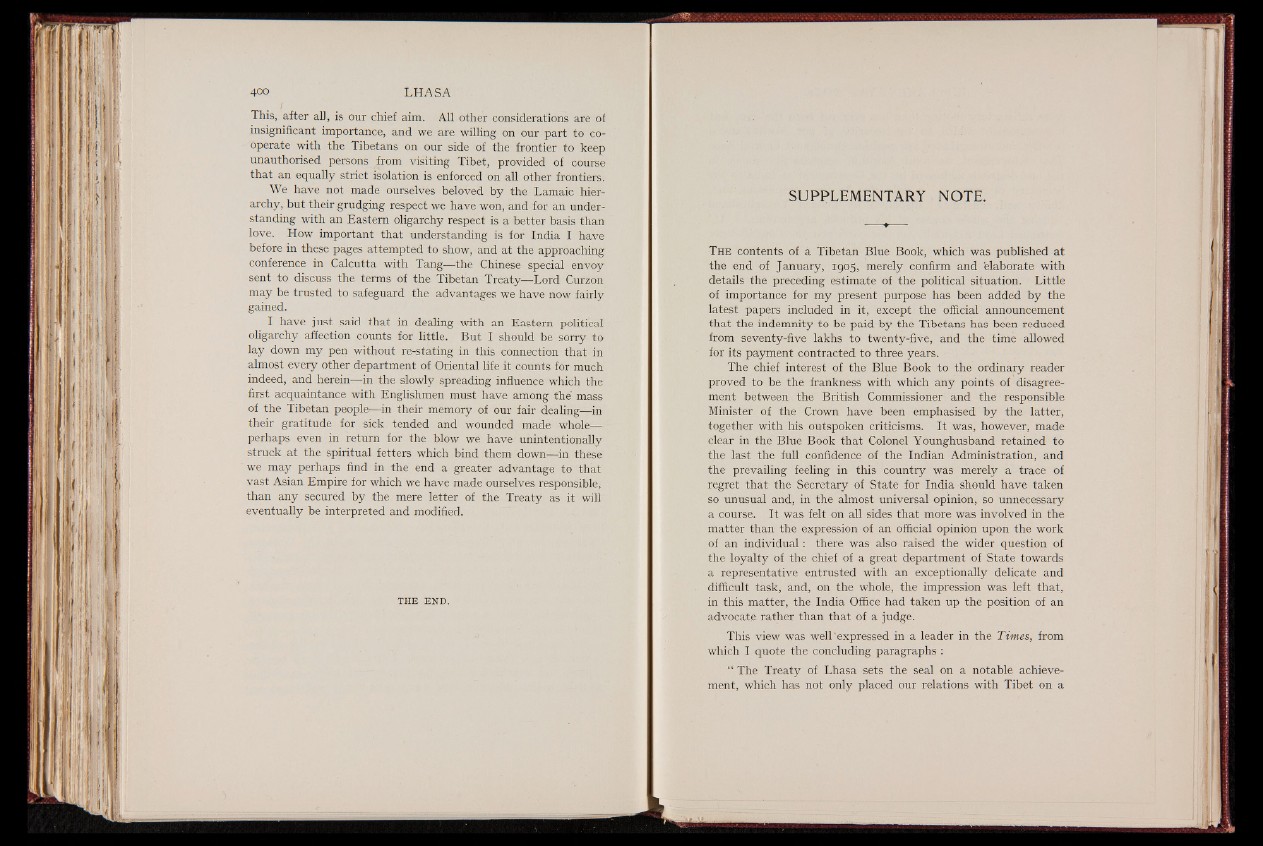
This, after all, is our chief aim. All other considerations are of
insignificant importance, and we are willing on our part to cooperate
with the Tibetans on our side of the frontier to keep
unauthorised persons from visiting Tibet, provided of course
that an equally strict isolation is enforced on all other frontiers.
We have not made ourselves beloved by the Lamaic hierarchy,
but their grudging respect we have won, and for an understanding
with an Eastern oligarchy respect is a better basis than
love. How important that understanding is for India I have
before in these pages attempted to show, and at the approaching
conference in Calcutta with Tang— the Chinese special envoy
sent to discuss the terms of the Tibetan Treaty— Lord Curzon
may be trusted to safeguard the advantages we have now fairly
gained.
I have just said that in dealing with an Eastern political
oligarchy affection counts for little. But I should be sorry to
lay down my pen without re-stating in this connection that in
almost every other department of Oriental life it counts for much
indeed, and herein— in the slowly spreading influence which the
first acquaintance with Englishmen must have among the mags
of the Tibetan people- - in their memory of our fair dealing— in
their gratitude for sick tended and wounded made whol<f|H
perhaps even in return for the blow we have* unintentionally
struck at the spiritual fetters which bind them down— in these
we may perhaps find in the end a greater advantage to that
vast Asian Empire for which we have made ourselves responsible,
than any secured by the mere letter of the Treaty as it will
eventually be interpreted and modified.
THE END.
SUPPLEMENTARY NOTE.
— ♦— ■
T h e contents of a Tibetan Blue Book, which was published a t
the end of January, 1905, merely confirm and elaborate with
details the preceding estimate of the political situation. Little
of importance for my present purpose has been added by the
latest papers included in it, except the official announcement
that the indemnity to be paid by the Tibetans has been reduced
from seventy-five lakhs to twenty-five, and the time allowed
for its payment contracted to three years.
The chief interest of the Blue Book to the ordinary reader
proved to be the frankness with which any points of disagreement
between the British Commissioner and the responsible
Minister of the Crown have been emphasised by the latter,
together with his outspoken criticisms. It was, however, made
clear in the Blue Book that Colonel Younghusband retained to
the last the full confidence of the Indian Administration, and
the prevailing feeling in this country was merely a trace of
regret that the Secretary of State for India should have taken
so unusual and, in the almost universal opinion, so unnecessary
a course. It was felt on all sides that more was involved in the
matter than the expression of an official opinion upon the work
of an individual: there was also raised the wider question of
the loyalty of the chief of a great department of State towards
a representative entrusted with an exceptionally delicate and
difficult task, and, on the whole, the impression was left that,
in this matter, the India Office had taken up the position of an
advocate rather than that of a judge.
This view was well “expressed in a leader in the Times, from
which I quote the concluding paragraphs :
“ The Treaty of Lhasa -sets the seal on a notable achievement,
which has not only placed our relations with Tibet on a